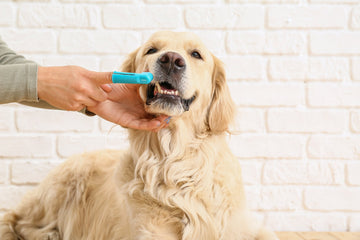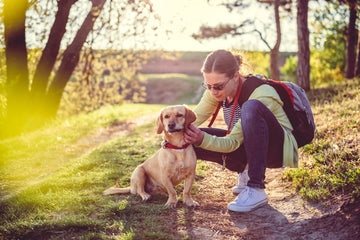Paws Off: Strategies for Pet Poison Prevention

What common household items are toxic to pets?
As pet owners, it’s our responsibility to create a safe environment for our furry companions. From everyday foods to household cleaning products, many items that seem harmless to us can be extremely dangerous if our pets ingest or are exposed to them.. For peace of mind and a healthy and safe cat or dog, take a look at these common toxic items:
Foods
The most common foods that are harmful to cats and dogs include:
- Chocolate, which contains theobromine and caffeine, can lead to vomiting, diarrhea, and even death.
- Onions and garlic, whether raw, cooked, or powdered, can damage red blood cells in pets, leading to anemia and other health issues.
- Grapes and raisins can result in kidney failure, diarrhea, lethargy, and vomiting, specifically for dogs.
- Xylitol, often found in sugar-free gum and candies, is extremely toxic to dogs. Causing a rapid release of insulin, xylitol poses risk of low blood sugar levels, seizures, and liver failure.
Plants
Many cats love to nibble on houseplants, but some common indoor and outdoor varieties of plants contain toxins that are harmful to our furry companions. For instance, lilies are particularly harmful to cats and can cause kidney failure if ingested. Also, ferns and ivy can cause irritation and gastrointestinal upset, while azaleas can result in vomiting and cardiovascular problems. We recommend choosing only cat-safe herbs and household plants to avoid gastrointestinal stress or poisoning.
Medications
Human prescription and over-the-counter drugs can be harmful to our furry friends. Particularly, common household medications like ibuprofen and acetaminophen, such as Advil and Tylenol, are extremely toxic to pets. These substances can cause liver failure, kidney failure, and gastrointestinal ulcers.
Also, painkillers such as oxycodone can cause respiratory depression and sedation, antidepressants can cause tremors and seizures, and ADHD medications like Adderall can cause elevated heart rate. We recommend keeping all medication out of reach of pets, particularly if your dog likes to chew plastic, and always consult with your veterinarian before giving your pet any kind of medication.
Cleaning Supplies
Household cleaning supplies containing ammonia, bleach, and other disinfectants pose serious health risks to pets if ingested or inhaled. Symptoms include respiratory issues, irritation, and gastrointestinal upset. Keep your pets far away from areas you are cleaning with these products, and make sure the space is well-ventilated so there is fresh air when they re-enter. Do not let your cat or dog walk on surfaces that are damp with bleach, ammonia, or household disinfectants as they may lick their paws after and unknowingly ingest the substances, or (in rare cases) may be affected by absorption through the paw pads.
Chemicals
We know many household chemicals are toxic, but our beloved pets do not know what substances are dangerous, so we must make sure to prevent their exposure to these household compounds. Common chemicals used to combat pests like insecticides and rodenticides contain toxic compounds that can lead to severe poisoning in your cat or dog - remember, these products are designed to poison and kill creatures, so keep them far away from your beloved cat or dog. Antifreeze is another particularly harmful substance, containing ethylene glycol, which can be lethal to pets - make sure Antifreeze vessels are closed tightly and stored safely to avoid any exposure to ethylene glycol.
Essential Oils
While many of us consider essential oils to be natural remedies and pleasant aromatics, they can be toxic to pets if ingested, applied topically, or inhaled in excess. Specifically, essential oils which contain phenols such as tea tree oil can cause painful symptoms in cats and dogs ranging from skin irritation to gastrointestinal upset. While you may feel comfortable using Essential Oils on your own body and around the home, we recommend keeping your pet away from any concentrated plant essence or compound unless it is approved by your veterinarian.
What do I do if my cat or dog has eaten or been exposed to a household toxin?
If your pet ingests or is showing symptoms of exposure to a toxic substance, rapidly getting them treatment is critical. Immediately contact your emergency veterinarian or pet poison control hotline for guidance, and follow their instructions carefully. When in doubt, promptly seek emergency veterinary care. In some cases, inducing vomiting in dogs can save their life, but can also be dangerous depending on the type of toxin ingested. Learn more about inducing vomiting as an emergency response from Dr. Justine A. Lee, Doctor of Veterinary Medicine specializing in Emergency & Critical Care, here on Pet Health Network.
Prevention strategies
To keep our furry friends out of harm's way, prevention is key! Here are our top prevention strategies:
- Ensure all of your household items like chemicals and cleaners, along with food and medication, are closed tightly and stored out of reach of all pets.
- Purchase pet-friendly alternatives like non-toxic cleaners and pet-safe plants for your home.
- As part of your weekly housekeeping routine, scan your home and yard for potential hazards.
- Provide your pet with plenty of exercise and safe toys to keep them busy and stimulated, so they don’t go looking for trouble.
- Continue to educate yourself on common household toxins, and do your research before purchasing items or cleaning supplies that might be accessible to or come into contact with your pets.


